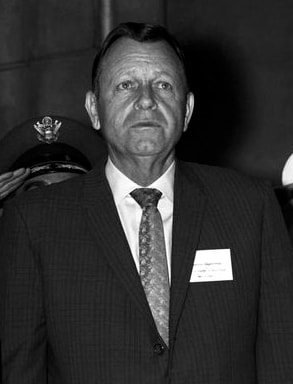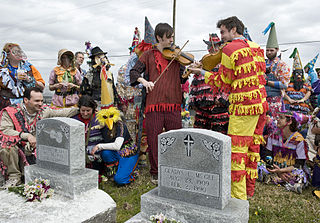The music of Louisiana can be divided into three general regions: rural south Louisiana, home to Creole Zydeco and Old French, New Orleans, and north Louisiana. The region in and around Greater New Orleans has a unique musical heritage tied to Dixieland jazz, blues, and Afro-Caribbean rhythms. The music of the northern portion of the state starting at Baton Rouge and reaching Shreveport has similarities to that of the rest of the US South.

Cajun music, an emblematic music of Louisiana played by the Cajuns, is rooted in the ballads of the French-speaking Acadians of Canada. Although they are two separate genres, Cajun music is often mentioned in tandem with the Creole-based zydeco music. Both are from southwest Louisiana and share French and African origins. These French Louisiana sounds have influenced American popular music for many decades, especially country music, and have influenced pop culture through mass media, such as television commercials.

Yodeling is a form of singing which involves repeated and rapid changes of pitch between the low-pitch chest register and the high-pitch head register or falsetto. The English word yodel is derived from the German word jodeln, meaning "to utter the syllable jo". This vocal technique is used in many cultures worldwide. Recent scientific research concerning yodeling and non-Western cultures has shown that music and speech evolved from a common prosodic precursor.

James Houston Davis was an American singer, songwriter, and politician. After achieving fame for releasing both sacred and popular songs, Davis served as governor of Louisiana from 1944 to 1948 and again from 1960 to 1964. As Governor, he was an opponent of efforts to desegregate Louisiana.
Western swing is a subgenre of American country music that originated in the late 1920s in the West and South among the region's Western string bands. It is dance music, often with an up-tempo beat, which attracted huge crowds to dance halls and clubs in Texas, Oklahoma and California during the 1930s and 1940s until a federal war-time nightclub tax in 1944 contributed to the genre's decline.

Louisiana Hayride was a radio and later television country music show broadcast from the Shreveport Municipal Memorial Auditorium in Shreveport, Louisiana, that during its heyday from 1948 to 1960 helped to launch the careers of some of the greatest names in American country and western music. Created by KWKH station manager Henry Clay, the show is notable as a performance venue for a number of 1950s country musicians, as well as a nascent Elvis Presley.
Swamp pop is a music genre indigenous to the Acadiana region of south Louisiana and an adjoining section of southeast Texas. Created in the 1950s by young Cajuns and Creoles, it combines New Orleans–style rhythm and blues, country and western, and traditional French Louisiana musical influences. Although a fairly obscure genre, swamp pop maintains a large audience in its south Louisiana and southeast Texas homeland, and it has acquired a small but passionate cult following in the United Kingdom, and Northern Europe

Music in the United States underwent many shifts and developments from 1900 to 1940. The country survived both World War I and the Great Depression before entering World War II in December 1941. Americans endured great loss and hardship but found hope and encouragement in music. The genres and styles present during this period were Native American music, blues and gospel, jazz, swing, Cajun and Creole music, and country. The United States also took inspiration from other cultures and parts of the world for her own music. The music of each region differed as much as the people did. The time also produced many notable singers and musicians, including jazz figure Louis Armstrong, blues and jazz singer Mamie Smith, and country singer Jimmie Rodgers.
Western music is a form of country music composed by and about the people who settled and worked throughout the Western United States and Western Canada. Western music celebrates the lifestyle of the cowboy on the open ranges, Rocky Mountains, and prairies of Western North America. Directly related musically to old English, Irish, Scottish, and folk ballads, also the Mexican folk music of Northern Mexico and Southwestern United States influenced the development of this genre, particularly corrido, ranchera, New Mexico and Tejano. Western music shares similar roots with Appalachian music, which developed around the same time throughout Appalachia and the Appalachian Mountains. The music industry of the mid-20th century grouped the two genres together under the banner of country and western music, later amalgamated into the modern name, country music.
"You Are My Sunshine" is a standard of American old-time country music and one of the official state songs of Louisiana. Though its original writer is disputed, according to the performance rights organisation BMI in 2000, the song had been recorded by over 350 artists and translated into 30 languages.

Amédé Ardoin was an American musician, known for his high singing voice and virtuosity on German-made one-row diatonic button accordions. He is credited by Louisiana music scholars with laying the groundwork for both Creole and Cajun music in the early 20th century, and wrote several songs now regarded as Cajun and zydeco standards. His music and playing greatly inspired post-war Cajun accordion builders like Marc Savoy.

Alphonse "Bois Sec" Ardoin was a Creole accordionist who specialized in the Creole music called "la la music" or "la musique Creole" and was influential in what became zydeco music.

Canray Fontenot was an American Creole fiddle player, who has been described as "the greatest Creole Louisiana French fiddler of our time."

Cajun music has its roots based in the ballads of the French-speaking Acadians of Canada, and in country music.
Ryan André Brasseaux is an American scholar of vernacular American music and an education administrator. He has served as the Dean of Davenport College at Yale University since 2011. He is an expert on the history of Cajun music, and a frequent collaborator with the Lost Bayou Ramblers.
Leo Soileau was one of the most prolific Cajun recording artists of the 1930s and 1940s, recording over 100 songs, which was a substantial amount considering the reluctance to record the music during its early stages. He is known as the second person to record a Cajun record and the first to record this genre with a fiddle.
The culture of Louisiana involves its music, food, religion, clothing, language, architecture, art, literature, games, and sports. Often, these elements are the basis for one of the many festivals in the state. Louisiana, while sharing many similarities to its neighbors along the Gulf Coast, is unique in the influence of Louisiana French culture, due to the historical waves of immigration of French-speaking settlers to Louisiana. Likewise, African-American culture plays a prominent role. While New Orleans, as the largest city, has had an outsize influence on Louisiana throughout its history, other regions both rural and urban have contributed their shared histories and identities to the culture of the state.

Joel Savoy is a Cajun musician and music producer from Southwest Louisiana. His father Marc Savoy, famous accordion builder and musician, and his mother, Ann Savoy, author and music producer, are well known ambassadors and supporters of preserving the Cajun culture.

Cajun fiddle music is a part of the American fiddle music canon. It is derived from the music of southwest Louisiana and southeast Texas, as well as sharing repertoire from the Quebec and Cape Breton Island traditions. It is one of the few extant North American folk music traditions rooted in French chanson. According to Ron Yule, "Louisiana fiddling had its birth roots in Europe, with fiddling being noted as early as the 1400s in Scotland". Zydeco music is a geographically, culturally, and musically related style.










